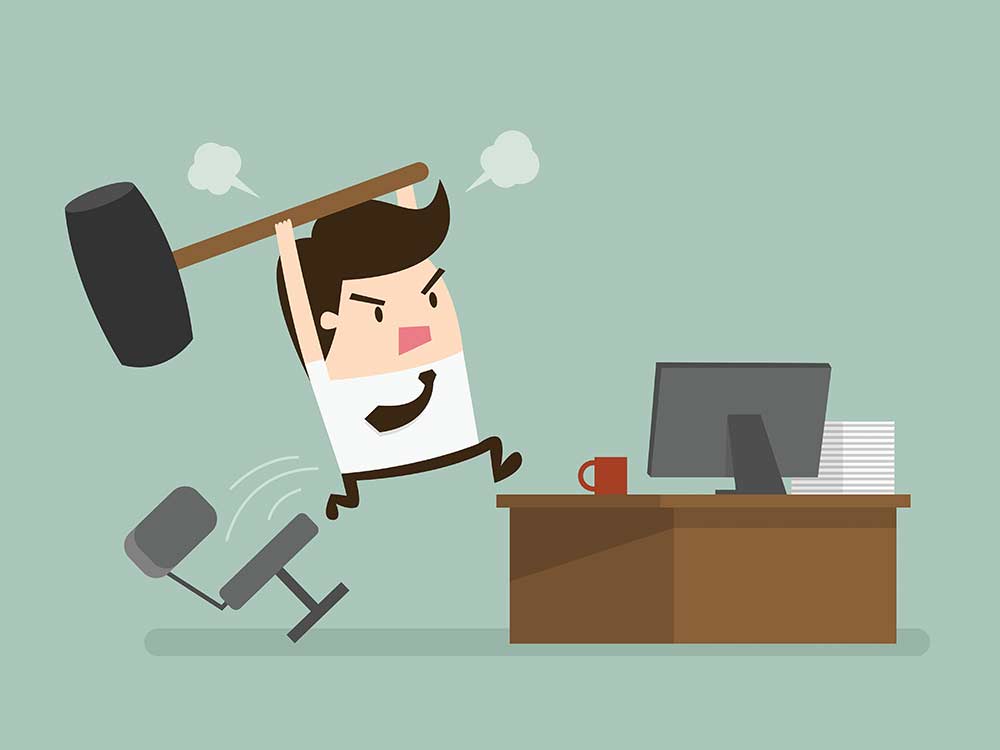Men, Work Stress and Anger – 3 Tips for Healthy Coping
There is a very clear link between work stress and anger—especially among men, who are much more likely than women to turn to alcohol when they are feeling angry. When a recent study at the University of Vermont compared male problem drinkers’ motivations to drink with female problem drinkers’ motivations to drink, anger was more often the cause for alcohol abuse among men (whereas women were more likely to drink for other reasons).
Research at Harvard has additionally suggested that a far greater proportion of men in this country are so angry they are diagnosable: some 10 million American men suffer from a condition known as intermittent explosive disorder (IED), according to an article in Men’s Health. Men who suffer from IED have trouble controlling their temper, quickly and disproportionately flaring up in response to relatively small stimuli.
The Link Between Work Stress and Anger in Men
The link between work stress and anger may be stronger among men because of differences in how they respond to stress and what they find stressful. As Dr. Gail Gross notes, in an article in The Huffington Post, generally speaking, men in the workplace tend to be hormonally and evolutionarily more attuned to winning and performance. In Dr. Gross’ words, “for a woman, the worst stress is a threat to her relationships, and for a man, it is the inability to perform, compete, and achieve.”
More often than not, too, stress at work involves issues related to performance, competition, and achievement, making men arguably more susceptible to on-the-job demands and pressures (by virtue of their being more hard-wired to get stressed out by these very same issues).
In these instances, anger can function as a helpful internal barometer of one’s stress levels. When stress like brewing lava begins to build up, due to job pressures and the juggling of work and family life, it’s easier to blow one’s lid. We may lash out in anger at those around us and their requests or demands—or, we may find ourselves simmering at a low-level boil with frustration or resentment. On a deeper level, our anger may be self-directed: we may be frustrated that we are not being enough, doing enough, or taking time for ourselves.
3 Tips for Healthy Coping With Work Stress-Related Anger
- Practice regular self-care. “Self-care” does not equate with drinking in order to feel less stressed or angry. Stress requires an active outlet like exercise, which is a fantastic way to channel and process anger. Exercise also helps to burn away excess energy and stress-induced endorphins. Active meditation is another healthy form of self-care since it helps us reconnect with ourselves, with those around us, and, ultimately, with what’s more important than today’s harried commute or annual performance evaluation.
- Focus on what you can do (as opposed to what you can’t do) to change or improve your work environment. The more helpless you feel about your situation, the more stressed-out you’ll be. In even the most stressful situations, though, there are things you can do to improve your circumstances. If a job is stressing you out and causing you to feel angry and resentful, brainstorm what you can do to better the situation. Chances are, you’ll notice your stress levels begin to fall as you begin to feel more empowered.
- Get professional help if your anger seems unmanageable, is triggering substance abuse, and/or is causing other health issues like depression or heart problems. The benefit to consulting with a licensed mental health professional is that they often can help you develop cognitive behavioral tools for coping with anger. If left untreated, anger can cause serious health problems that in turn create more stress. Research has suggested that men especially are prone to these anger-related health effects.
Got a tip for coping with work-induced anger? Share it with the rest of us!


